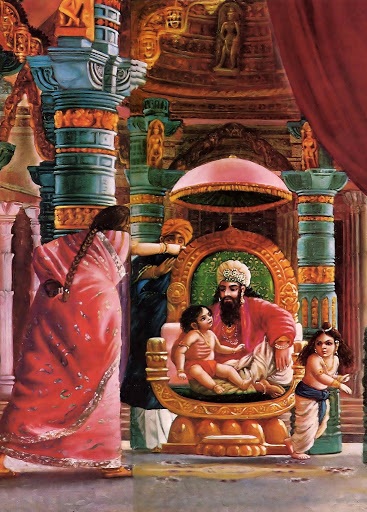 Historically (perhaps (?) since the days of Prof. Max Muller and Dr. George Thibet), the Sanskrit word ‘brahman‘ is rendered into English as Consciousness which is ‘caitanya.’ ‘brahman‘ is derived from the root “bRh” which means very huge. The derivation can take many forms like:
Historically (perhaps (?) since the days of Prof. Max Muller and Dr. George Thibet), the Sanskrit word ‘brahman‘ is rendered into English as Consciousness which is ‘caitanya.’ ‘brahman‘ is derived from the root “bRh” which means very huge. The derivation can take many forms like:
bRihatvAt – unimaginably Infinite in expansiveness;
brahmaNatvAt – encloses everything within Itself (all-inclusive);
barhaNatvAt – deliquesces [assimilates (absorbs/dissolves) all into Itself.]
Possibly “Colossus” may have been better or a more appropriate translation for brahman, IMHO, because Consciousness captures only one aspect of brahman, the other two being Beingness and Bliss (going by the popular “sat-cit-Ananda“).
Vedanta offers us three unique prakriyA-s (processes) to ‘understand each of the three aspects of brahman, as follows: Continue reading

 Dhruva was an adorable little boy. He saw his half-brother, Uttama, sitting and playing on the lap of their father, King Uttanapada. He too desired to climb on to the lap of Uttanapada. But his step-mother could hardly tolerate that. She gave a tight slap to him declaring that he was unfit to sit on the lap of the King as he was not born to her but to another queen. Crest-fallen and deeply hurt, the little kid, with his eyes full of tears, ran to his mother. His mother, a highly noble lady, consoled him and advised that he should achieve something so that people look at him with awe. The little Dhruva left the royal palace and went away to a distant forest. He met with a group of Sages in the forest and narrated to them his soulful story. They advised him to meditate on Vishnu. So, he embarked on a very austere and rigorous course of meditation. Regretting heavily the developments, the King and all his retinue, his mother, the queen and all his family implored that he should give up his askesis and return home. The King was even ready to abdicate the throne and promised to coronate him. But Dhruva was unrelenting. He did not succumb to the temptations and was uncompromising in his resolve. He pursued his meditation with greater vigor. He meditated on Vishnu, the Ultimate.
Dhruva was an adorable little boy. He saw his half-brother, Uttama, sitting and playing on the lap of their father, King Uttanapada. He too desired to climb on to the lap of Uttanapada. But his step-mother could hardly tolerate that. She gave a tight slap to him declaring that he was unfit to sit on the lap of the King as he was not born to her but to another queen. Crest-fallen and deeply hurt, the little kid, with his eyes full of tears, ran to his mother. His mother, a highly noble lady, consoled him and advised that he should achieve something so that people look at him with awe. The little Dhruva left the royal palace and went away to a distant forest. He met with a group of Sages in the forest and narrated to them his soulful story. They advised him to meditate on Vishnu. So, he embarked on a very austere and rigorous course of meditation. Regretting heavily the developments, the King and all his retinue, his mother, the queen and all his family implored that he should give up his askesis and return home. The King was even ready to abdicate the throne and promised to coronate him. But Dhruva was unrelenting. He did not succumb to the temptations and was uncompromising in his resolve. He pursued his meditation with greater vigor. He meditated on Vishnu, the Ultimate.